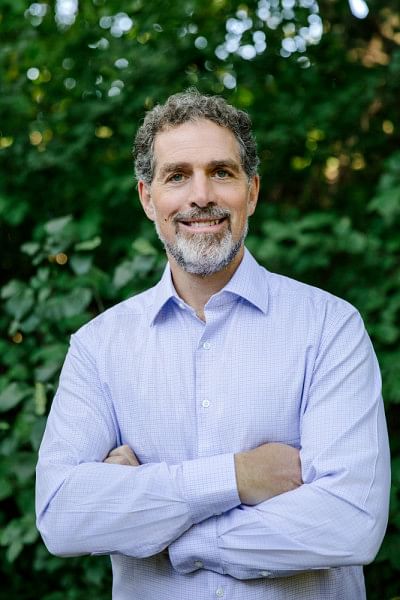Clear vision for all: A dream of VisionSpring

The Daily Star (TDS): VisionSpring helps low-income people get glasses. It works with non-profits, social entrepreneurs, the government, and corporations to offer affordable glasses. Why did it all start with eyes?
Dr. Jordan Kassalow (JK): It is my field of expertise as I am an eye doctor. And when you are working in a field, sometimes, you identify a corridor of indifference. And the biggest one I saw was that no one cared about the billion people in the world who were visually impaired or blind because they didn't have a pair of eyeglasses. Glasses can have a significant impact on one's professional and personal life. However, over a billion people need this 700-year-old technology yet lack access to it.
TDS: What is the vision of VisionSpring?
JK: The vision of VisionSpring is to ensure that everyone who needs a pair of glasses gets a pair of glasses. It is to ensure that every boy and girl who needs a pair of glasses to see to learn and every adult who needs them to see to work and be productive has them. We look at vision as a right. Everyone should have access to this essential health product.
TDS: What was the inspiration behind such an initiative?
JK: When I was a student, I joined an organization that brought vision services to underserved markets in central and Latin America. My first patient was a seven-year-old boy who was in the school for the blinds. Yet as we examined his eyes, we realized he wasn't actually blind. He just needed a strong pair of eyeglasses. And when I put the glasses on his face, and he saw for the first time, it was a very powerful moment. It was a moment that changed both of our lives. I like to say I gave him his vision. And he gave me mine. Since that day, I've been working on this project.
TDS: How has the journey been of VisionSpring so far?
JK: It has been a rewarding journey of 20 years but also a challenging one. A lot of people were skeptical about our model. We faced many obstacles in raising money and finding talent for the organization. But we have come a long way. In our first year, we sold 800 pairs of glasses. And last year, the sale was 1.5 million pairs of glasses. Collectively across the world, we have reached 10 million people.
Over the years, VisionSpring has proved that non-medical doctors can be trained to provide basic eyecare services making them more available. The World Health Organization has adopted this model and created their own online training using the methodology largely developed here in Bangladesh through VisionSpring and BRAC.
BRAC has been our main partner in Bangladesh for the past sixteen years. We approached them to add eyeglasses to their basic health care services provided by the Shasthya Shebika program. These women were then trained to screen for the need for reading glasses, determine the appropriate power, and introduce secondary and tertiary-level eye care for patients with severe conditions. We want to continue and expand through The Reading Glasses for Improved Livelihoods Programme. We are now working in 61 districts of Bangladesh to broaden access to affordable and quality glasses to the last group of the pyramid.
TDS: What are the prospects of VisionSpring in Bangladesh?
JK: The prospects of VisionSpring in Bangladesh are tremendous. About 20 million people in Bangladesh need glasses but don't have them. We recently celebrated with BRAC and others on reaching 2 million people of those people. So, we have a long way to go.
We also now have 500 pharmacies selling simple reading glasses. In most of the western world, such as the United States and Europe, people can go into a pharmacy, or into even a grocery store or gas station, and pick up a simple pair of ready-made reading glasses. That hasn't been possible here. And so one of the prospects and one of our channels of distribution is to bring the same practice happening all across the world, which is to make sure that people can access simple, affordable reading glasses through the pharmacies.
Moreover, VisionSpring has conducted a study with BRAC, which is soon to be published, that shows eyeglasses increase income significantly by more than 30%. The study covered a wide variety of occupations including tailors, artisans, mechanics, farmers, agricultural laborers, etc. In addition, we currently are conducting a study in the garment sector and anticipate it will show that when people who need eyeglasses get them, their absentee rate goes down, wastage of materials is reduced, quality control of the product goes up, and productivity goes up. The study will help businesses, factories, and workplaces to see the link between ensuring clear vision for their workers and improving their business.
TDS: What are the achievements in Bangladesh till now?
JK: The most significant achievement till now would be reaching 2 million low-income people with BRAC through their community health program. We have seen that even the poorest people in the world are willing to spend between one and two days of their salary for a pair of glasses if we remove the price restraint. So, VisionSpring sells these eyeglasses for 150 Taka, bringing the cost way down through an innovative social entrepreneurship model with BRAC. For 90% of these customers, it was their first pair of glasses.
We also started Clear Vision Collective in collaboration with ten other eyecare organizations, including the Bangladeshi Ministry of Health and Family Welfare in the district of Sherpur. Through this program, we have been able to raise the coverage from 19% at the time we began to almost 50% of people having eyeglasses in the district.
TDS: Have you faced any challenges here?
JK: One of our great challenges, which has been true for many years now, is importing the glasses. The import duties on our glasses are 78% because glasses are considered a luxury item. And we have been trying to emphasize that this is a basic public health technology. When the custom duty is 78%, it increases the cost significantly. Another challenge is just a lack of awareness. A lot of people either aren't aware that they need eyeglasses or, if they are aware, they're reticent about wearing them. A leading misconception behind it is they think eyeglasses will make their eyes worse.
TDS: Now that you have reached a significant milestone, what is the next step?
JK: It took us ten years to hit our first million. It just took us six years more to hit our second million. I aim to return to Bangladesh in three years to celebrate our fifth million. So we really want to start to scale and accelerate this scaling rate.
VisionSpring wants to ensure everyone in Bangladesh in need of eyeglasses gets access to affordable and attractive eyeglasses. We want people to understand the value these glasses can provide them in their learning, work, quality of life, well-being, and safety on the road.

 For all latest news, follow The Daily Star's Google News channel.
For all latest news, follow The Daily Star's Google News channel. 



Comments